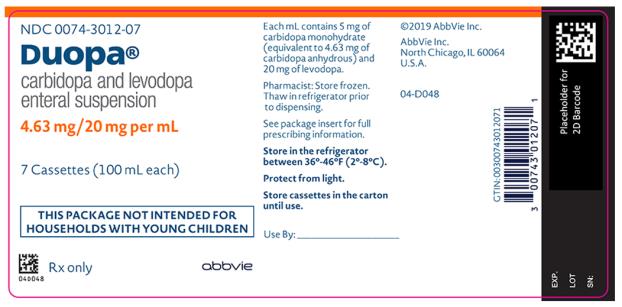Duopa
Generic name: carbidopa and levodopa enteral
Drug class: Dopaminergic antiparkinsonism agents
Medically reviewed by A Ras MD.
What is Duopa?
Duopa is a prescription medicine that is used to treat Parkinson’s disease. It is used to treat signs like Parkinson’s disease caused by other health problems. Duopa may be given to you for other reasons.
Description
DUOPA is a combination of carbidopa, an inhibitor of aromatic amino acid decarboxylation, and levodopa, an aromatic amino acid.
Carbidopa is a white, crystalline compound, slightly soluble in water, with a molecular weight of 244.2. It is designated chemically as (2S)-3-(3,4-dihydroxyphenyl)-2-hydrazino-2-methylpropanoic acid monohydrate. Its empirical formula is C10H14N2O4•H2O, and its structural formula is:

The content of carbidopa in DUOPA is expressed in terms of anhydrous carbidopa which has a molecular weight of 226.3. The 4.63 mg/mL of anhydrous carbidopa is equivalent to 5.0 mg/mL of carbidopa.
Levodopa is a white, crystalline compound, slightly soluble in water, with a molecular weight of 197.2. It is designated chemically as (2S)-2-Amino-3-(3,4-dihydroxyphenyl) propanoic acid. Its empirical formula is C9H11NO4, and its structural formula is:

The inactive ingredients in DUOPA are carmellose sodium and purified water.
Mechanism of Action
Carbidopa
When levodopa is administered orally, it is rapidly decarboxylated to dopamine in extracerebral tissues so that only a small portion of a given dose is transported unchanged to the central nervous system. Carbidopa inhibits the decarboxylation of peripheral levodopa, making more levodopa available for delivery to the brain.
Levodopa
Levodopa is the metabolic precursor of dopamine, does cross the blood-brain barrier, and presumably is converted to dopamine in the brain. This is thought to be the mechanism whereby levodopa treats the symptoms of Parkinson’s disease.
Before taking Duopa, tell your doctor:
- If you are allergic to Duopa; any part of this medicine; or any other drugs, foods, or substances. Tell your doctor about the allergy and what signs you had.
- If you have any of these health problems: Glaucoma, a skin lump or growth, or a history of skin cancer.
- If you are taking any of these drugs: Reserpine or tetrabenazine.
- If you are taking any of these drugs: Linezolid or methylene blue.
- If you have taken certain drugs for depression or Parkinson’s disease in the last 14 days. This includes isocarboxazid, phenelzine, tranylcypromine, selegiline, or rasagiline. Very high blood pressure may happen.
- If you are taking another drug that has the same drug in it.
This is not a list of all drugs or health problems that interact with this medicine.
Tell your doctor and pharmacist about all of your drugs (prescription or OTC, natural products, vitamins) and health problems. You must check to make sure that it is safe for you to take Duopa with all of your drugs and health problems. Do not start, stop, or change the dose of any drug without checking with your doctor.
What are some things I need to know or do while I take Duopa?
- Tell all of your health care providers that you take Duopa. This includes your doctors, nurses, pharmacists, and dentists.
- Avoid driving and doing other tasks or actions that call for you to be alert until you see how Duopa affects you.
- To lower the chance of feeling dizzy or passing out, rise slowly if you have been sitting or lying down. Be careful going up and down stairs.
- This medicine may affect certain lab tests. Tell all of your health care providers and lab workers that you take Duopa.
- Have blood work checked as you have been told by the doctor. Talk with the doctor.
- If you have high blood sugar (diabetes), talk with your doctor about which glucose tests are best to use.
- This medicine may “wear off” as the time for your next dose gets closer. Tell your doctor if this happens and it bothers you.
- Talk with your doctor before you drink alcohol or use other drugs and natural products that slow your actions.
- The chance of a type of skin cancer called melanoma may be raised in people with Parkinson’s disease. It is not known if Duopa may also raise the chance. Have skin exams while you take Duopa. Talk with your doctor.
- Some products may cause a dark red, brown, or black color to appear in your saliva, urine, or sweat. This is not harmful but may discolor your clothes.
- Some people have fallen asleep during activities like driving, eating, or talking. Some people did not feel sleepy and felt alert right before falling asleep. This has happened up to 1 year after Duopa was started. If you fall asleep during activities, do not drive or do other tasks or actions that call for you to be alert while you take Duopa. Call your doctor right away if this happens or you feel very sleepy.
- Neuroleptic malignant syndrome (NMS) is a very bad and sometimes deadly health problem that has happened when Duopa was stopped all of a sudden. NMS has also happened when the dose of Duopa was lowered. Call your doctor right away if you have any fever, muscle cramps or stiffness, dizziness, very bad headache, confusion, change in thinking, fast heartbeat, heartbeat that does not feel normal, or are sweating a lot.
- If you are 65 or older, use Duopa with care. You could have more side effects.
- Tell your doctor if you are pregnant, plan on getting pregnant, or are breast-feeding. You will need to talk about the benefits and risks to you and the baby.
How is Duopa best taken?
Use Duopa as ordered by your doctor. Read all information given to you. Follow all instructions closely.
- It is given as an infusion through a tube connected to your bowels.
- Your doctor will teach you how to take Duopa.
- Take the oral form of Duopa as you have been told by your doctor.
- This medicine needs to be at room temperature before use. Take a cassette out of the carton and out of the refrigerator 20 minutes before using.
- Do not reuse casettes. Do not use a cassette for longer than 16 hours, even if some drug is left.
- If you need to disconnect the pump for a short time (less than 2 hours), follow what your doctor has told to do or read the package insert. If you need to disconnect the pump for longer than 2 hours, call your doctor to find out what to do.
- If you take an iron product or a multivitamin that has iron, ask your doctor or pharmacist how to take it with Duopa. Iron may lower how well your body is able to absorb Duopa.
- Diets high in protein, fat, or calories may lower how well your body absorbs Duopa; tell your doctor if you have a diet like this or if you will be changing your diet. Talk with your doctor.
- Do not stop taking Duopa all of a sudden or lower your dose without talking to your doctor. Side effects may happen.
- Keep taking Duopa even when you are not having symptoms.
- Keep a diary of your signs.
- Keep taking Duopa as you have been told by your doctor or other health care provider, even if you feel well.
- Take Duopa at the same time of day.
What do I do if I miss a dose?
- Call your doctor to find out what to do.
What are the side effects of Duopa that I need to call my doctor about immediately?
WARNING/CAUTION: Even though it may be rare, some people may have very bad and sometimes deadly side effects when taking a drug. Tell your doctor or get medical help right away if you have any of the following signs or symptoms that may be related to a very bad side effect:
- Signs of an allergic reaction, like rash; hives; itching; red, swollen, blistered, or peeling skin with or without fever; wheezing; tightness in the chest or throat; trouble breathing, swallowing, or talking; unusual hoarseness; or swelling of the mouth, face, lips, tongue, or throat.
- Signs of high or low blood pressure like very bad headache or dizziness, passing out, or change in eyesight.
- Signs or symptoms of depression, suicidal thoughts, emotional ups and downs, abnormal thinking, anxiety, or lack of interest in life.
- Change in the way you act.
- Hallucinations (seeing or hearing things that are not there).
- Feeling confused.
- Strong urges that are hard to control (such as eating, gambling, sex, or spending money).
- A skin lump or growth.
- Change in color or size of a mole.
- Trouble controlling body movements that is new or worse.
- Throwing up blood or throw up that looks like coffee grounds.
- Black, tarry, or bloody stools.
- Stomach pain.
- Chest pain or pressure.
- Fast or abnormal heartbeat.
- Fever, chills, or sore throat; any unexplained bruising or bleeding; or feeling very tired or weak.
- Dark urine or yellow skin or eyes.
- Change in eyesight, eye pain, or very bad eye irritation.
- Shortness of breath.
- A burning, numbness, or tingling feeling that is not normal.
- Problem with the device or problem where the tube goes into your body.
- Swelling in the arms or legs.
- Stomach or bowel problems can happen with Duopa. Some of these problems may lead to the need for surgery or may be deadly. This includes problems like stomach or bowel bleeding, blockage, or ulcers; infection or other problems where the tube goes into your body; or pancreatitis. Call your doctor right away if you have dark, tarry, or bloody stools; fever; upset stomach or throwing up; constipation that does not go away; or stomach pain.
What are some other side effects of Duopa?
All drugs may cause side effects. However, many people have no side effects or only have minor side effects. Call your doctor or get medical help if any of these side effects or any other side effects bother you or do not go away:
- Bad dreams.
- Constipation.
- Dizziness.
- Feeling sleepy.
- Dry mouth.
- Headache.
- Trouble sleeping.
- Throat pain.
These are not all of the side effects that may occur. If you have questions about side effects, call your doctor. Call your doctor for medical advice about side effects.
You may report side effects to the FDA at 1-800-332-1088. You may also report side effects at https://www.fda.gov/medwatch.
If overdose is suspected:
If you think there has been an overdose, call your poison control center or get medical care right away. Be ready to tell or show what was taken, how much, and when it happened.
How do I store and/or throw out Duopa?
- Store in a refrigerator. Do not freeze.
- Store in original container.
- Protect from light.
- Keep all drugs in a safe place. Keep all drugs out of the reach of children and pets.
- Throw away unused or expired drugs. Do not flush down a toilet or pour down a drain unless you are told to do so. Check with your pharmacist if you have questions about the best way to throw out drugs. There may be drug take-back programs in your area.
Label
PRINCIPAL DISPLAY PANEL
- NDC 0074-3012-07
- Duopa®
- carbidopa and levodopa
enteral suspension - 4.63 mg / 20 mg per mL
- 7 Cassettes (100 mL each)
- THIS PACKAGE NOT INTENDED FOR
HOUSEHOLDS WITH YOUNG CHILDREN - Each mL contains 5 mg of carbidopa monohydrate
- (equivalent to 4.63 mg of carbidopa anhydrous) and 20 mg of levodopa.
- Pharmacist: Store frozen.
Thaw in refrigerator prior to dispensing. - See package insert for full prescribing information.
- Store in the refrigerator between 36°-46°F (2°-8°C).
- Protect from light.
- Store cassettes in the carton until use.
- Rx only
- abbvie

SRC: NLM .
